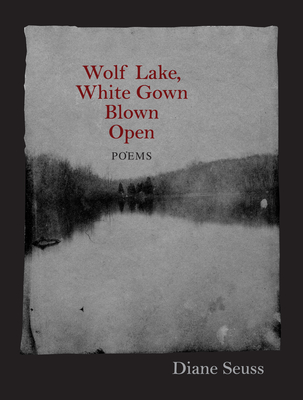Wolf Lake, White Gown Blown Open: Poems

Wolf Lake, White Gown Blown Open: Poems
Diane Seuss's poems grow out of the fertile soil of southwest Michigan, bursting any and all stereotypes of the Midwest and turning loose characters worthy of Faulkner in their obsession, their suffering, their dramas of love and sex and death. The first section of this collection pays homage to the poet's roots in a place where the world hands you nothing and promises less, so you are left to invent yourself or disappear. From there these poems both recount and embody repeated acts of defiant self-creation in the face of despair, loss, and shame, and always in the shadow of annihilation. With darkly raucous humor and wrenching pathos, Seuss burrows furiously into liminal places of no dimension-- state lines, lakes' edges, the space "between the m and the e in the word amen." From what she calls "this place inbetween" come profane prayers in which "the sound of hope and the sound of suffering" are revealed to be "the same music played on the same instrument." Midway through this book, a man tells the speaker that beauty is that which has not been touched. This collection is a righteous and fierce counterargument: in the world of this imagination, beauty spills from that which has been crushed, torn, and harrowed. "We receive beauty," Seuss writes, "as a nail receives / the hammer blow." This is the poetry that comes only after the white dress has been blown open--the poetry of necessity, where a wild imagination is the only hope.
Diane Seuss's poems grow out of the fertile soil of southwest Michigan, bursting any and all stereotypes of the Midwest and turning loose characters worthy of Faulkner in their obsession, their suffering, their dramas of love and sex and death. The first section of this collection pays homage to the poet's roots in a place where the world hands you nothing and promises less, so you are left to invent yourself or disappear. From there these poems both recount and embody repeated acts of defiant self-creation in the face of despair, loss, and shame, and always in the shadow of annihilation.With darkly raucous humor and wrenching pathos, Seuss burrows furiously into liminal places of no dimension-- state lines, lakes' edges, the space between the m and the e in the word amen. From what she calls this place inbetween come profane prayers in which the sound of hope and the sound of suffering are revealed to be the same music played on the same instrument. Midway through this book, a man tells the speaker
PRP: 105.09 Lei
Acesta este Prețul Recomandat de Producător. Prețul de vânzare al produsului este afișat mai jos.
94.58Lei
94.58Lei
105.09 LeiLivrare in 2-4 saptamani
Descrierea produsului
Diane Seuss's poems grow out of the fertile soil of southwest Michigan, bursting any and all stereotypes of the Midwest and turning loose characters worthy of Faulkner in their obsession, their suffering, their dramas of love and sex and death. The first section of this collection pays homage to the poet's roots in a place where the world hands you nothing and promises less, so you are left to invent yourself or disappear. From there these poems both recount and embody repeated acts of defiant self-creation in the face of despair, loss, and shame, and always in the shadow of annihilation. With darkly raucous humor and wrenching pathos, Seuss burrows furiously into liminal places of no dimension-- state lines, lakes' edges, the space "between the m and the e in the word amen." From what she calls "this place inbetween" come profane prayers in which "the sound of hope and the sound of suffering" are revealed to be "the same music played on the same instrument." Midway through this book, a man tells the speaker that beauty is that which has not been touched. This collection is a righteous and fierce counterargument: in the world of this imagination, beauty spills from that which has been crushed, torn, and harrowed. "We receive beauty," Seuss writes, "as a nail receives / the hammer blow." This is the poetry that comes only after the white dress has been blown open--the poetry of necessity, where a wild imagination is the only hope.
Diane Seuss's poems grow out of the fertile soil of southwest Michigan, bursting any and all stereotypes of the Midwest and turning loose characters worthy of Faulkner in their obsession, their suffering, their dramas of love and sex and death. The first section of this collection pays homage to the poet's roots in a place where the world hands you nothing and promises less, so you are left to invent yourself or disappear. From there these poems both recount and embody repeated acts of defiant self-creation in the face of despair, loss, and shame, and always in the shadow of annihilation.With darkly raucous humor and wrenching pathos, Seuss burrows furiously into liminal places of no dimension-- state lines, lakes' edges, the space between the m and the e in the word amen. From what she calls this place inbetween come profane prayers in which the sound of hope and the sound of suffering are revealed to be the same music played on the same instrument. Midway through this book, a man tells the speaker
Detaliile produsului











